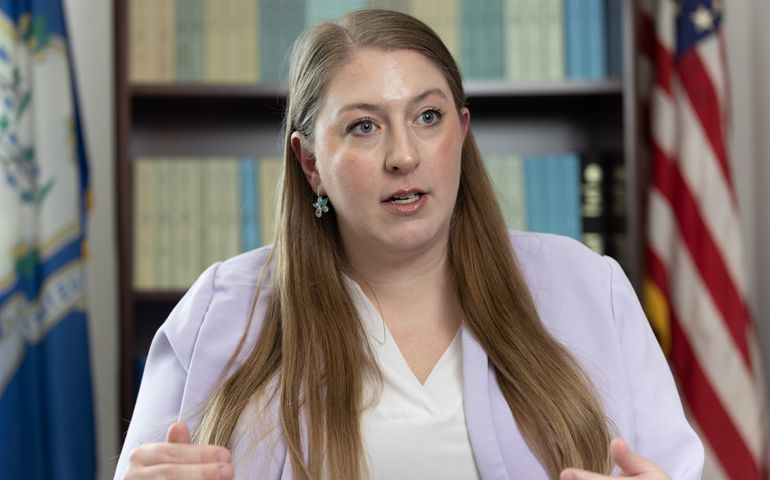Processing Your Payment
Please do not leave this page until complete. This can take a few moments.
-
News
-
Editions
-
- Lists
-
Viewpoints
-
HBJ Events
-
Event Info
- 2024 Economic Outlook Webinar Presented by: NBT Bank
- Best Places to Work in Connecticut 2024
- Top 25 Women In Business Awards 2024
- Connecticut's Family Business Awards 2024
- What's Your Story? A Small Business Giveaway 2024 Presented By: Torrington Savings Bank
- 40 Under Forty Awards 2024
- C-Suite and Lifetime Achievement Awards 2024
- Connecticut's Health Care Heroes Awards 2024
-
-
Business Calendar
-
Custom Content
- News
-
Editions
View Digital Editions
Biweekly Issues
- April 29, 2024
- April 15, 2024
- April 1, 2024
- March 18, 2024
- March 4, 2024
- February 19, 2024
- February 5, 2024
- January 22, 2024
- January 8, 2024
- + More
Special Editions
- Lists
- Viewpoints
-
HBJ Events
Event Info
- View all Events
- 2024 Economic Outlook Webinar Presented by: NBT Bank
- Best Places to Work in Connecticut 2024
- Top 25 Women In Business Awards 2024
- Connecticut's Family Business Awards 2024
- What's Your Story? A Small Business Giveaway 2024 Presented By: Torrington Savings Bank
- 40 Under Forty Awards 2024
- C-Suite and Lifetime Achievement Awards 2024
- Connecticut's Health Care Heroes Awards 2024
Award Honorees
- Business Calendar
- Custom Content
‘Broad discretion in setting rates’: Judge sides with PURA, dismissing most claims in Aquarion’s rate cut appeal
 HBJ PHOTO | STEVE LASCHEVER
Public Utilities Regulatory Authority Chair Marissa Gillett discusses her more active regulatory philosophy with the Hartford Business Journal.
HBJ PHOTO | STEVE LASCHEVER
Public Utilities Regulatory Authority Chair Marissa Gillett discusses her more active regulatory philosophy with the Hartford Business Journal.
A judge in a ruling issued Tuesday dismissed the majority of Aquarion Water Co.’s appeal of a rate cut ordered by the Public Utilities Regulatory Authority last year.
Superior Court Judge Matthew Budzik sided with PURA in dismissing nine of the 12 counts of Aquarion’s appeal. He remanded two counts to PURA, along with part of a third.
Budzik upheld PURA’s methodology in determining rate cases, saying that the agency has broad discretion. He dismissed Aquarion’s claim that the rate decision was “confiscatory.”
“The court concludes that the total effect of PURA’s rate decision is not confiscatory and that Aquarion has failed to meet its heavy burden of demonstrating otherwise,” Budzik wrote.
He added: “It bears repeating that PURA possesses broad regulatory authority and equally broad discretion in setting rates.”
The decision held that PURA's disallowance of $5.9 million for plant additions "was not improper because it was based on a new rule or procedure," as Aquarion had argued.
"PURA is permitted to make its own factual determinations and is not required to accept evidence presented by Aquarion," Budzik wrote in the 34-page decision.
Budzik also upheld PURA's calculation of Aquarion's return on equity and said PURA"s choice of how to calculate accumulated depreciation is “well within PURA's regulatory discretion."
The ruling also held that PURA correctly determined that, to be included as a pro forma adjustment to rate base, expenditures must be found to be prudent, and “used and useful."
Utilities have argued that they need to be able to recover costs of future capital investments. However, PURA says that utilities “may only earn a return on capital assets that are complete and servicing customers” – which the court decision affirmed.
Rate case
Last year, Aquarion requested total annual revenue of $236 million and a return on equity of 10.35%, which would have resulted in an increase to the average residential customer’s water bill of about 9%, or $61 per year.
In its decision on March 15, 2023, PURA reduced Aquarion’s annual revenue to $195.5 million and authorized a return on equity of 8.7% – significantly less than the utility enjoyed previously.
PURA’s decision was expected to decrease the average residential customer’s annual water bill by 11%, or about $67 per year.
Aquarion, which serves 208,000 customers in 59 cities and towns, is Connecticut’s largest water utility and primarily serves western Connecticut. It’s a subsidiary of Eversource Energy.
Public Utilities Regulatory Authority Chair Marissa Gillett, who began in her role in 2019, has adopted a tough stance on utilities. Her philosophy is that utility rate increases should be based on performance, including outcomes and value to customers.
But that philosophy has drawn criticism.
Last year, Aquarion’s rate cut spooked investors and prompted credit-rating service Moody’s to lower the water company’s financial outlook to “negative” amid a regulatory environment it called “unpredictable.”
A spokesman for Aquarion, Peter Fazekas, said at the time the change from a stable to negative outlook “poses significant risks for Connecticut customers as they will pay more for the necessary infrastructure for the reliable delivery of high-quality drinking water.”
United Illuminating’s appeal
Electric utility United Illuminating Co. (UI) also has appealed a rate decision by PURA. UI requested a $131 million revenue increase over three years. PURA approved a $22.96 million increase.
UI requested a 10.2% return on equity, which PURA lowered to 9.1%. Until certain performance issues identified by PURA are addressed, the return on equity will be 8.63%.
That case is pending in New Britain Superior Court.
UI, based in Orange, is a subsidiary of Avangrid and serves more than 341,000 customers in Connecticut
Small wins for Aquarion
In the Aquarion case, the court sided with the utility on several issues. It remanded a recalculation of Aquarion's state and federal tax expenses to PURA, after PURA conceded during an oral argument.
Also, the court agreed that PURA applied the wrong legal standard in denying portions of Aquarion's legal and other expenses related to this case. The court remanded the matter to PURA for reconsideration according to state statutes.
In Count 12, Aquarion challenged PURA’s treatment of excess accumulated deferred income
taxes (EADIT funds) held by Aquarion as a result of a reduction in the corporate tax rate under the 2017 Tax Cuts and Jobs Act. PURA ordered Aquarion to carry the EADIT funds at the weighted average cost of capital (WACC) rate until the money is returned to customers.
However, the court found that the WACC rate requirement was “arbitrary and capricious,” and remanded the issue to PURA.
Response
A spokesperson for Aquarion said he had no comment other than that the company is reviewing Tuesday’s decision.
PURA, meanwhile, said it was pleased with the decision.
“Since the appeal was remanded back to PURA, we are limited in what we can comment on,” PURA spokesperson Joe Cooper said. “But the Authority appreciates that the court thoroughly considered the record and applied both long-standing and recent legal precedent that recognizes the Authority’s statutory obligation and broad authority to balance the important interests of all stakeholders in rate proceedings.”
Also, Consumer Counsel Claire Coleman applauded the decision. The Office of Consumer Counsel intervened in the case.
“Consistent with long-standing principles of regulatory law, I am pleased to see the Superior Court’s decision affirm that consumers deserve thorough examination of utilities’ requests for rate increases in order to prevent consumers from overpaying,” Coleman said. “I am proud of my team’s work during the rate case and the appeal, where our scrutiny and legal analysis helped lead to important cost reductions and the proper application of important ratemaking legal principles to the benefit of Aquarion Water Company’s customers, as well as all utility consumers in Connecticut.”
Read the decision below:

2022 Giving Guide
This special edition informs and connects businesses with nonprofit organizations that are aligned with what they care about. Each nonprofit profile provides a crisp snapshot of the organization’s mission, goals, area of service, giving and volunteer opportunities and board leadership.
Learn more
Subscribe
Hartford Business Journal provides the top coverage of news, trends, data, politics and personalities of the area’s business community. Get the news and information you need from the award-winning writers at HBJ. Don’t miss out - subscribe today.
Subscribe
2024 Book of Lists
Delivering Vital Marketplace Content and Context to Senior Decision Makers Throughout Greater Hartford and the State ... All Year Long!
Read Here-
2022 Giving Guide
This special edition informs and connects businesses with nonprofit organizations that are aligned with what they care about. Each nonprofit profile provides a crisp snapshot of the organization’s mission, goals, area of service, giving and volunteer opportunities and board leadership.
-
Subscribe
Hartford Business Journal provides the top coverage of news, trends, data, politics and personalities of the area’s business community. Get the news and information you need from the award-winning writers at HBJ. Don’t miss out - subscribe today.
-
2024 Book of Lists
Delivering Vital Marketplace Content and Context to Senior Decision Makers Throughout Greater Hartford and the State ... All Year Long!
ABOUT
ADVERTISE
NEW ENGLAND BUSINESS MEDIA SITES
No articles left
Get access now
In order to use this feature, we need some information from you. You can also login or register for a free account.
By clicking submit you are agreeing to our cookie usage and Privacy Policy
Already have an account? Login
Already have an account? Login
Want to create an account? Register
Get access now
In order to use this feature, we need some information from you. You can also login or register for a free account.
By clicking submit you are agreeing to our cookie usage and Privacy Policy
Already have an account? Login
Already have an account? Login
Want to create an account? Register






0 Comments